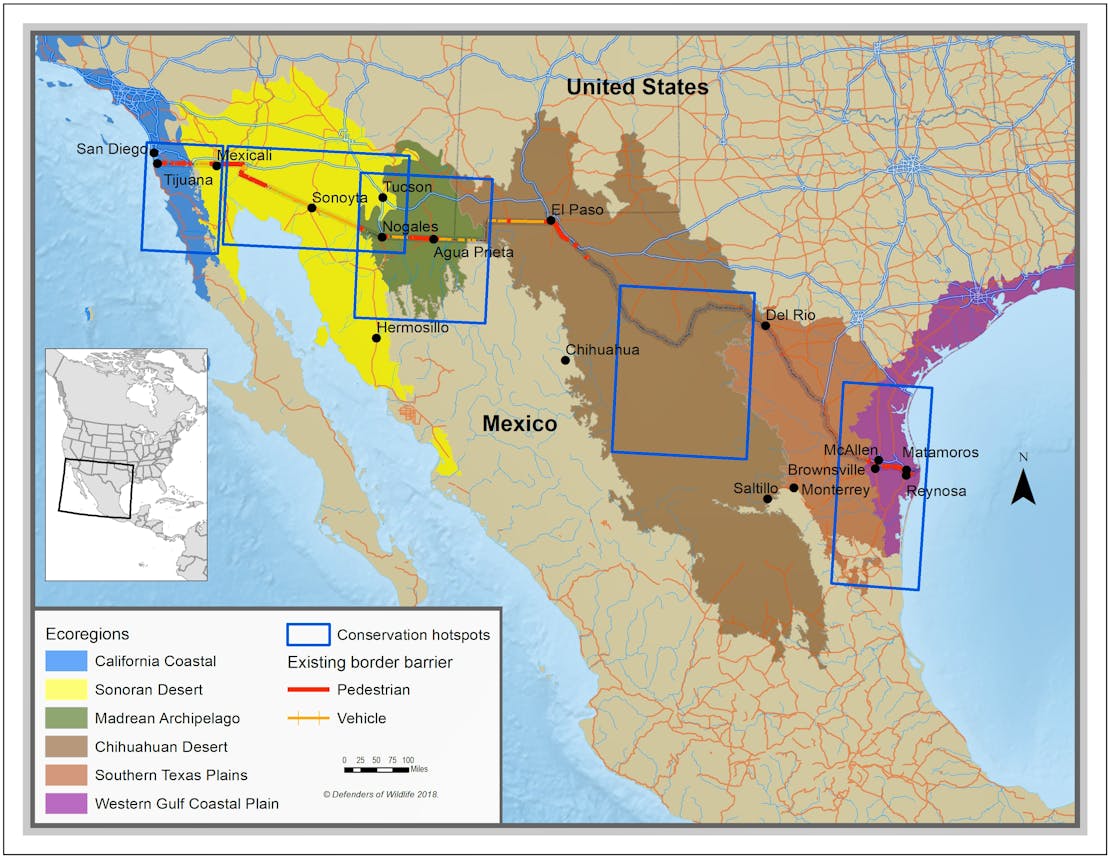Two bills were introduced in the Senate to prevent wall construction in sensitive borderland areas and restore the rule of law along the border. Senator Tom Udall (D-NM) introduced a bill that would revoke the authority of the Secretary of Homeland Security to waive federal laws in the effort to expedite border wall construction and Senator Martin Heinrich’s (D-NM) bill would prevent wall construction in Federal wildlife and wilderness areas as well as on state lands.
Walls block wildlife migration routes, trap and drown animals during floods, increase mortality of endangered and vulnerable species, and irreversibly damage fragile landscapes. Current wall proposals directly target the Lower Rio Grande Valley National Wildlife Refuge in Texas, as well as Bentsen Rio Grande Valley State Park, the National Butterfly Center and the La Lomita chapel in Mission, Texas, threatening critically endangered ocelots and other rare species. More broadly, the U.S.-Mexico border cuts through the ranges of more than 1,500 native animal and plant species that would be placed at risk by additional border wall. A peer-reviewed article published in Bioscience and signed by more than 2,900 scientists declared the border wall would be a disaster for biodiversity.
Section 102 of the 2005 REAL ID Act gave the Secretary of Homeland Security unprecedented power to waive any federal, state, or local law to construct roads and barriers along the border. This waiver has already been invoked ten times under both the Trump and George W. Bush administrations to exempt the department from nearly 50 environmental laws, including the National Environmental Policy Act, the Endangered Species Act, and the National Wildlife Refuge Improvement Act, to construct roads and barriers along the U.S.-Mexico border.
It is long past time for Congress to revisit the waiver authority granted under the Real ID Act. The Real ID Act is the broadest waiver ever enacted, providing absolute and unreviewable discretion to the Secretary of Homeland Security to exempt her department from compliance with any law — federal, state or local — in building border walls. Acting under that sweeping invitation to disregard the law, the Department of Homeland Security has repeatedly waived the most basic environmental protections.
We applaud Senators Udall and Heinrich for taking action to protect our border from reckless border construction and to restore the rule of law along our nation’s borders. These two bills will address the threat of significant harm wall construction could cause to wildlife and the environment, first by ensuring full compliance with applicable laws and second by prohibiting barrier construction in wildlife refuges, wilderness, wildlife corridors, or state land.
Defenders of Wildlife and other groups have fought for more than a decade to convince the federal courts that the Real ID is an unconstitutional violation of separation of powers, and that no government official should be allowed to place themselves above the law. Wall construction along any portion of our southern border is devastating to border communities, lands and wildlife, and it is imperative our congressional leadership pushes back against it.









